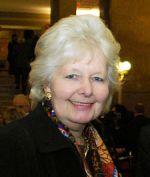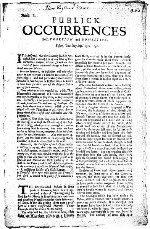Over at the “Beat the Press” blog, Ralph Ranalli makes it official: longtime panelist Joe Sciacca is out now that he’s been promoted to editor of the Boston Herald. So who will replace Joe on the WGBH-TV (Channel 2) program? Follow the link, and you can make your own suggestions.
Month: July 2010 Page 2 of 5

Margaret Marshall
The big local news of the day is that Margaret Marshall, chief justice of the state’s Supreme Judicial Court, is retiring in order to take care of her ailing husband, retired New York Times columnist Anthony Lewis.
But before Marshall joined the SJC, she was general counsel for Harvard University, using hardball tactics to make accusations of racial discrimination go away. I wrote about her Harvard days for the Boston Phoenix in 1999.
My take back then was that Marshall was not the liberal firebrand her supporters were hoping she’d be. Yet she will forever be known as the author of the Goodridge (pdf) decision, which paved the way for same-sex marriage in Massachusetts. It is a magnificent legacy, and Media Nation sends her best wishes upon her retirement.
And speaking of Lewis, I’ve read two of his books on the First Amendment, and they are both first-rate: “Make No Law: The Sullivan Case and the First Amendment” and “Freedom for the Thought We Hate: A Biography of the First Amendment.” Highly recommended.
In a very smart move, Boston magazine announced today that it has persuaded former Boston Globe columnist Eileen McNamara to write a monthly column. Romenesko has the details and the press release.
McNamara, who won the 1997 Pulitzer Prize for Commentary, is now a journalism professor at Brandeis University. Says McNamara:
These are challenging times for the city and for the commonwealth. I am eager to rejoin the public conversation and excited to join the talented team of journalists at Boston magazine.
Like many others at the Globe, McNamara in 2007 took an early-retirement buyout while the paper was going through several rounds of painful downsizing. Her voice has been missed, and I’m glad to learn that we’ll be hearing from her once again.
I was going to try to write up last night’s Hacks/Hackers meeting at Microsoft’s Cambridge headquarters. But I can’t do any better than Kyle Psaty, who covers it for the BostInnovation blog. Hosted by Matt Carroll of the Boston Globe, the gathering brought together about 75 journalists and technology folks. What follows are just a couple of quick observations.
Fernanda Viégas and Martin Wattenberg of Flowing Media showed off a new data-presentation tool taking campaign-finance information from MapLight.org and slicing and dicing it in a number of different ways. Interesting, though the tools Viégas and Wattenberg demo’d struck me as a little exotic. Globe technology reporter Hiawatha Bray was very excited, so I’m sure those more technologically adept than I will find uses for it.
Somewhat more down-to-earth was a project called Pinyadda, a website that combines journalism, community and social networking. Based on the presentation made by Austin Gardner-Smith, the Boston-based company’s vice president for product and development, Pinyadda may be groping its way toward a just-right space between Digg (too dumb) and NewsTrust (too hard). I’m hoping to find the time to play with it and see for myself.
I learned a few things, met some interesting people, ate some free pizza — what more can you ask for?
Boston Herald media reporter Jessica Heslam has the story: managing editor Joe Sciacca will succeed departing editor-in-chief Kevin Convey, thus ending any speculation that publisher Pat Purcell might make an outside pick. Sciacca speaks:
I can’t think of a more exciting time for the Herald as we launch new initiatives for print and online. We will continue to deliver the ambitious reporting and unique perspective that Herald readers have come to rely on.
Congratulations to Joe, a longtime colleague on “Beat the Press.” And since I can’t leave this without at least a little bit of dangling speculation, will Sciacca have time to keep his television gig now that he’s at the top of the Herald’s masthead?
 Big news today at One Herald Square: Kevin Convey, a longtime Herald veteran who’s been editor-in-chief for the past three-plus years, is leaving to become editor of New York’s Daily News. He replaces Martin Dunn, whose departure was reportedly prompted by his wife’s battle with cancer.
Big news today at One Herald Square: Kevin Convey, a longtime Herald veteran who’s been editor-in-chief for the past three-plus years, is leaving to become editor of New York’s Daily News. He replaces Martin Dunn, whose departure was reportedly prompted by his wife’s battle with cancer.
I haven’t seen this mentioned anywhere, but Dunn was editor of the Herald for a very brief period in the early 1990s.
Convey’s new job entails a switch of tabloid loyalties. In Boston, the Herald is allied with its former owner, Rupert Murdoch. Herald publisher Pat Purcell, who bought the paper from his old boss in 1994, helps Murdoch run regional properties such as the Standard-Times of New Bedford and the Cape Cod Times.
In New York, the Daily News — owned by real-estate mogul Mort Zuckerman, who also has significant Boston ties — has been entangled for years in a steel-cage death match with the New York Post, whose owner, of course, is Murdoch. Here is the Daily News’ press release, along with Convey’s reaction:
I am looking forward to the challenge of editing the Daily News, which has some of the most talented people in the newspaper business and the web anywhere in the world. It is a great privilege.
Convey’s a smart guy who took over the Herald at a time when the paper, and the news business in general, was shrinking drastically. During the 1990s, he was part of the triumvirate that ran the paper, serving as managing editor for features along with editor Andy Costello and managing editor for news Andrew Gully. The trio was known, sometimes affectionately, sometimes not, as the “Micks with Dicks,” a commentary on their aggression as much as it was on their ethnicity.
Convey became editor-in-chief of Community Newspaper Co., which published about 100 papers in Eastern Massachusetts, when Purcell added it to his holdings in the early 2000s. After Purcell sold CNC to GateHouse Media a few years later, Convey returned to the Herald, serving as the paper’s number-two while editorial director Ken Chandler, tarted it up and made it more gossipy — more of a tabloid, if you like. After Chander moved on, Convey took over.
Howard Kurtz of the Washington Post wrote about Convey’s Herald in 2008.
Best of luck to Convey, who’s a good guy, and whom I generally found to be helpful and accessible back when I was covering the local media for the Boston Phoenix.
Needless to say, it will be fascinating to see who ends up succeeding Convey at the Herald.
Update: Well, that didn’t take long.
Correction: Ken Chandler’s name now fixed, thanks to an alert reader.
 The week’s best listen is NPR’s “On the Media,” which weighs in with a special program on the future of the newspaper business. At least that’s what they call it, but the show is really broader than that, hitting all the right themes on the fate of professional journalism.
The week’s best listen is NPR’s “On the Media,” which weighs in with a special program on the future of the newspaper business. At least that’s what they call it, but the show is really broader than that, hitting all the right themes on the fate of professional journalism.
Among the topics: whether the government should play a role in saving the news business; whether newspapers should charge for online content (a tired topic brought to life by a smart interview with one of my über-bosses, Guardian editor Alan Rusbridger); a conversation with James Fallows of the Atlantic about his recent article on Google’s news initiatives; and whether a renewed focus on local news will help bolster newspapers’ bottom lines.
Grab the MP3 and listen. It’s as good an overview as I’ve come across in recent months.
Conservative blogger D.R. Tucker writes this response at Red Mass Group. I respond to a response by Republican State Committee member Cynthia Stead. There’s a whole lot of responding going on.
Good thing I covered my asterisk when writing about Howie Carr’s gig at a Republican fundraiser in New Hampshire. Because, as I suspected, he has done it many times. The former journalist sleepwalks his way through the details here.
To repeat: this is solely about Carr’s status as a Boston Herald columnist — not his job as a talk-show host for WRKO Radio (AM 680). It’s long since become accepted that radio folks will do such things, even though I don’t think they should.


